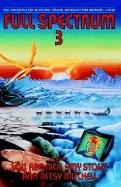What do you think?
Rate this book


560 pages, Mass Market Paperback
First published May 1, 1991
"The secret of cheese is patience," he said. "Cheese has taught me everything I know about life."
—p.23
Sometimes I wished I was a conservative. They seemed to have only three lines of ideological bullshit instead of two hundred.
—p.100
"You shouldn't leave a wallet unattended. This is a police station. There are all sorts of crooks here." After a perfectly timed comic pause, he added, "Some of them wear uniforms so you can spot them, but what about the others?"
—p.171
"Yes, for a scientist certainty is built on deep layers of doubt."
—p.240
"{...}Earth was not a viable option."
—p.252
That was the year before the year in which the gunfire and the huge lights winked and blazed, roared and stumbled, the year before that time when parties became hopeless and we were forced to consider the unavailing manner of all options.
—p.342
"What we do," said Van Rhys coldly, "we do to protect."
—p.446
"And that was the diagnosis, that she was suffering from an illness the doctors call 'Desire for Utopia.'"
—p.506
"Rose, your life has been so hard—aren't there some painful memories you'd rather not have?"
—p.521